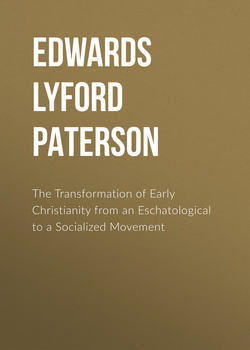Читать книгу The Transformation of Early Christianity from an Eschatological to a Socialized Movement - Edwards Lyford Paterson - Страница 2
CHAPTER II
THE EARLY CHURCH AND PROPERTY CONCEPTS
ОглавлениеThe Chiliasm of the early Christians had a direct bearing upon their attitude toward the property institutions and property concepts of the time. Neither the declension of Chiliasm nor the progressive socialization of the Church can be understood without some consideration of the attitude of the Christians toward property, and conversely the effect of the existing economic system upon the Christians.
The early Church made its appearance in a world where the institution of private property was supreme in fact and very largely unquestioned in theory. It is recognized with perfect clearness by all the ancient thinkers who refer to the subject that their civilization was based upon the property rights of man in man. It is not true that slavery was invariably considered part of the unalterable law of nature. Aristotle expressly states that a sufficient development of mechanistic technology would abrogate slavery. But such a technological development was not expected nor indeed wished for. Contempt for mechanical processes of industry was universal, with the dubious exception of the application of science to military engines. There is a similar unanimity in regard to commercial enterprise. Money obtained by ordinary mercantile methods was considered as dishonestly acquired. It was assumed as self-evident that the merchant had to be a thief. Interest on money was of course reprobated as contrary to nature.36
36
Cf. Plato, Laws, V, 742. Aristotle, Politics, 1:X, XI. Cicero, De Officus, II, XXV. Seneca, De Beneficus, VII, X.
